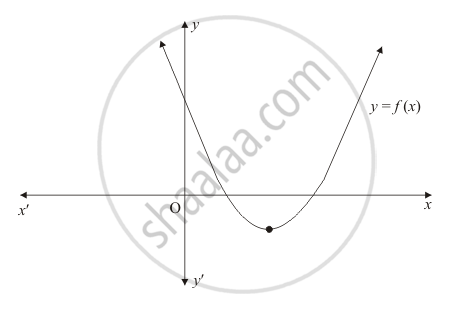Advertisements
Advertisements
Question
If α, β are the zeros of the polynomial p(x) = 4x2 + 3x + 7, then \[\frac{1}{\alpha} + \frac{1}{\beta}\] is equal to
Options
- \[\frac{7}{3}\]
- \[- \frac{7}{3}\]
- \[\frac{3}{7}\]
- \[- \frac{3}{7}\]
Solution
Since `alpha` and ß are the zeros of the quadratic polynomial p(x) = 4x2 + 3x + 7,
`alpha + ß = - (text{coefficient of x})/(text{coefficient of } x^2)`
`= (-3)/4`
`alpha ß = (\text{constat term})/(text{coefficient of} x^2)`
`= 7/4`
We have
`= 1/alpha + 1/ ß `
`= (ß + alpha )/(alpha ß )`
`= (-3)/(4/7)`
`= (-3)/4 xx4/7`
`= (-3)/cancel(4)xxcancel(4)/7`
`= (-3)/7`
The value of `1/alpha +1/beta` is `(-3)/7`
Hence, the correct choice is `(d)`
APPEARS IN
RELATED QUESTIONS
The graph of the polynomial f(x) = ax2 + bx + c is as shown below (Fig. 2.19). Write the signs of 'a' and b2 − 4ac.

If fourth degree polynomial is divided by a quadratic polynomial, write the degree of the remainder.
If f(x) = ax2 + bx + c has no real zeros and a + b + c = 0, then
State whether the given algebraic expression is polynomial. Justify.
`2m^(-2) + 7m - 5`
Divide. Write the quotient and the remainder.
21m2 ÷ 7m
Divide. Write the quotient and the remainder.
(2y3 + 4y2 + 3) ÷ 2y2
Find the quadratic polynomial, sum, and product of whose zeroes are −1 and −20 respectively. Also, find the zeroes of the polynomial so obtained.
Identify the following expression is polynomial. If not give reason:
`"m"^2 - root(3)("m") + 7"m" - 10`
Given that two of the zeroes of the cubic poly-nomial ax3 + bx2 + cx + d are 0, the third zero is ______.
Classify the following as a constant, linear, quadratic and cubic polynomials:
2 – x2 + x3
